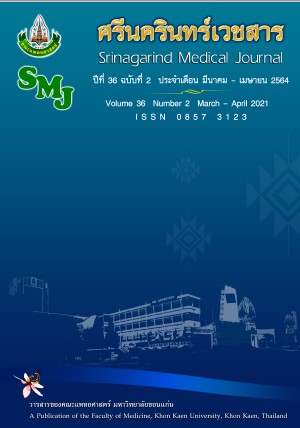ปัจจัยที่มีผลต่อศักยภาพของวิสัญญีพยาบาลในการช่วยวิสัญญีแพทย์ในการฉีดยาชาระงับความรู้สึกเข้าเส้นประสาทส่วนปลาย
Abstract
หลักการและวัตถุประสงค์: ศักยภาพด้านความรู้ ทักษะ และทัศนคติของวิสัญญีพยาบาลเป็นปัจจัยที่มีผลต่อความสำเร็จในการฉีดยาชาระงับความรู้สึกเข้าเส้นประสาทส่วนปลายของวิสัญญีแพทย์ การศึกษานี้มีวัตถุประสงค์เพื่อประเมินปัจจัยที่มีผลต่อศักยภาพของวิสัญญีพยาบาลในการช่วยทำหัตถการฯ
วิธีการศึกษา: เป็นแบบศึกษาไปข้างหน้าในโรงพยาบาลสงขลานครินทร์ โดยวิสัญญีพยาบาลจะได้รับการประเมินความรู้และทักษะในการช่วยหัตถการฯ ก่อนการบรรยาย 1 ชั่วโมงและฝึกปฏิบัติ 20 นาที ประเมินความรู้ ทักษะและทัศนคติหลังการอบรม 2 เดือน เปรียบเทียบความรู้ก่อนและหลังฝึกอบรมและหาปัจจัยที่มีผลต่อความรู้ ทักษะและทัศนคติหลังการฝึกอบรมโดยค่า p < 0.05 ถือว่ามีนัยสำคัญทางสถิติ
ผลการศึกษา: ได้รับแบบสอบถามกลับ ร้อยละ 87 ผู้ร่วมวิจัยมีอายุเฉลี่ย 33.09+9.55 ปี ผลประเมินคะแนนความรู้และทักษะ การช่วยหัตถการฯ หลังการฝึกอบรมสูงกว่าก่อนฝึกอบรมอย่างมีนัยสำคัญทางสถิติ (p<0.001) ปัจจัยที่มีผลต่อศักยภาพด้านความรู้ คืออายุและประสบการณ์การทำงาน (p=0.01) ปัจจัยที่มีผลต่อศักยภาพด้านทักษะ คือ ระดับการศึกษาปริญญาโท (p=0.002) (เปรียบเทียบกับปริญญาตรี)
สรุป: ภายหลังฝึกอบรม อายุและประสบการณ์การทำงานเป็นปัจจัยที่มีผลต่อศักยภาพด้านความรู้ ระดับการศึกษาเป็นปัจจัยที่มีผลต่อศักยภาพด้านทักษะของวิสัญญีพยาบาล ในการช่วยวิสัญญีแพทย์ทำหัตถการฯ
คำสำคัญ: สมรรถนะ; วิสัญญีพยาบาล; ยาชาระงับความรู้สึก
Background and objective: Competencies of knowledge, skill, and attitudes of nurse anesthetists may influence on successfulness of peripheral nerve block done by anesthesiologists. This study is to determine factors associated with competencies of nurse anesthetists assisting anesthesiologist in peripheral nerve block procedure.
Methods: This was a prospective cohort study at Songklanagarind hospital. All nurse anesthetists were initially received pretest (knowledge and skill) for assisting in peripheral nerve block procedure before underwent for ultrasound training (one-hour lecture and 20 minutes workshop). The posttests consisting of 3 categories (knowledge, skill and attitude) were evaluated 2 months after training. Then the pretest and posttest scores were compared as well as the factors associated with posttest score for each category was performed. P < 0.05 was considered statistically significant.
Results: The response rate was 87% (55/63). The mean age of participants was 33.09 + 9.55 years. Posttest scores regarding knowledge, and skill were significantly higher than pretest score (p<0.001). Factor associated with higher knowledge of nurse anesthetists was younger age and longer years of working experience (p = 0.01). Factors associated with higher skill of nurse anesthetists was master degree of graduation (compared with bachelor degree) (p = 0.002).
Conclusion: A comprehensive ultrasound training in conjunction with younger age but longer years of working experience of nurse anesthetist are significant factors associated with knowledge competency in nurse anesthetists whereas higher degree of graduation is significant factor associated with skill competency in nurse anesthetists assisting anesthesiologist to perform peripheral nerve block.
Keywords: Competency, nurse anesthetists, peripheral nerve block


